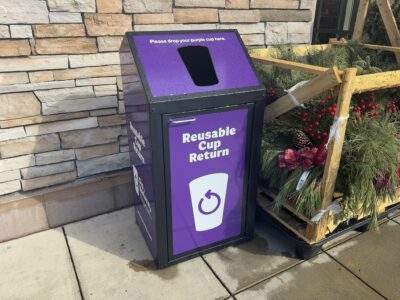
Two athletes, a ballet dancer, an architect, and a polyglot musician. These are the five multitalented students from the Spring 2019 Challenges of Sustainable Development course who formed a team over the summer to participate in the Global Retail Challenge, a competition focused on building a more circular economy for retail and consumer products. The Columbia team Interlock-It advanced through every round of the competition and brought home the third place. Pralaya Cuomo (GS Sustainable Development ’20) was awarded the inaugural Richard Donovan Best Speaker Award.
In 2018, the Bensadoun School of Retail Management at McGill University and RILA’s Retail Innovation Center, based in Washington D.C., launched the Global Retail Challenge (GRC). The competition was designed to tackle issues around retail, sustainability, and the circular economy — an economic system focused on eliminating waste and reusing resources.

The Global Retail Challenge is an intensive, high-energy competition where teams develop strategies and solutions for a specific case study. The 2019 competition had over 38 teams registered from 23 universities in 8 different countries, including Canada, France, Ghana, India, Japan, Portugal, Spain and the United States. Fifteen teams participated in the finals held in Montréal from November 13-16.
The Columbia team focused on developing a circular business in the furniture industry. They began their preparation in the summer with the formation of the team and initial reading and research on the circular economy and on sustainable retail industries. Over the course of eight weeks, the team actively participated in weekly virtual design thinking workshops and completed a series of challenging assignments to analyze and distill a transformational circular idea in the retail marketplace. Each week, they were mentored by leading global retail executives, who gave them personalized feedback on their work and ideas. They learned about the frontier ideas in the circular economy for retail and consumer products, assessed new consumer needs and technologies, dived into the details of business financials, and ultimately designed their solution and company.
After successfully completing the assignments, the team was invited to participate in the in-person finals, held at McGill University in Montréal, Canada. There, they heard from leading executives in the industry, including Aldo, Nespresso, and Accenture, and presented directly in front of leading retail executives and circular economy experts throughout several demanding rounds of the competition.
Who was on Team Columbia: Interlock-It?
The five students on the Columbia Team came from diverse backgrounds and experiences, with one thing in common: they all studied Challenges of Sustainable Development in the Spring of 2019. Julia Samson (CC ’20) studies sustainable development and is also captain of Columbia’s women’s swim team. Jesse Braun (CC ’21), on the men’s swim team, studies computer science. Pralaya Cuomo (GS ’20) studies sustainable development and trains in ballet. Victor Ohene (CC ’20) from Ghana studies architecture, bringing to the team his expertise in design and technology. Sophomore Vanessa Ho (CC ’22) from Macau is undecided on her major, but she is a talented musician who speaks (at least) eight languages. They were mentored by Jason Wong (Sustainable Development Ph.D. ’19), their Challenges of Sustainable Development instructor, who is now based at the London School of Economics and only speaks 6 languages.
What was their solution?
The Columbia team’s solution, Interlock-It, aims to create modular furniture products from discarded furniture items. Partnering with local sanitation departments, Interlock-It would collect, evaluate, and create standardized modular pieces either with eco-resin or by repurposing discarded items. With their mobile application, customers can build, design, and visualize their own pieces with multiple reconfiguration possibilities. They can share their designs on social media and have their modular, inter-lockable pieces ready to ship or for pick up. The team’s pitch was particularly relevant for urban millennial and Gen-Z customers who move around frequently and appreciate both the mobility and creativity enabled by the modular features of Interlock-It.

Team Interlock-It was awarded third place, ousting many teams of MBA students with more experience with case competitions. Their award included a cash prize of CAD$2000. As one of the top teams, they will earn an invitation to a post-competition incubator program with the chance to present at a retail-industry conference in 2020, after refining their work with guided mentorship.

An additional highlight of the awards ceremony was the presentation of the Best Speaker Award in honor of the late Professor Richard Donovan of the Desautels Faculty of Management at McGill. Professor Donovan was a distinguished teacher and scholar who was dedicated to experiential learning through case studies and helped design and lead original case competitions, including the Global Retail Challenge. The Best Speaker Award was established in his memory, to recognize an individual from a finalist team that exemplified Professor Donovan’s authentic and moving storytelling skills. Our team member, Pralaya Cuomo (GS ’20), was awarded the Richard Donovan Best Speaker Award with a prize of CAD$1000. Pralaya has been an invaluable member of the team. In the final pitch presentation, she delivered a moving, genuine portrayal of the team’s potential client, clearly articulated the product’s unique features with a down-to-earth sense of humor, and demonstrated deep knowledge of the team’s work. Her stage presence was friendly and confident, and her enthusiasm for the project was contagious.
Team Interlock-It will be presenting their work at the Spring 2020 Earth Institute Student Research Showcase. The team is grateful for generous funding from the Earth Institute’s Student Support Grant and the Conference Grant to enable their travel and participation in the competition.
Jason Wong is a fellow in Environmental Economics at the London School of Economics and Political Science. He previously taught SDEV UN2300 (Challenges of Sustainable Development) as co-instructor from 2016-2019. He is an alum of Columbia’s Ph.D. Program in Sustainable Development and a research affiliate at the Center for Sustainable Urban Development within the Earth Institute. He received the 2017 Presidential Award for Outstanding Teaching at Columbia University and served as an International Parliamentary Fellow at the German Parliament (Bundestag) in 2018.



